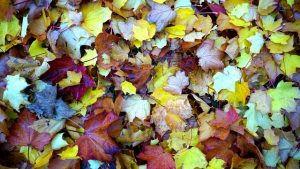Ah, yes, fall has come once again. The weather is cool, the leaves are falling, and pumpkin spice lattes warm our souls. Time to break out the winter clothes and snuggle up with a warm cup of hot cocoa. Just as we start to enjoy the changing of the seasons, we hear a sneeze across the office accompanied by coughing and agony. The season of viruses and colds has also begun. But why does it seem like we get more sickness in the fall and winter? And what can we do to prevent illness?
Changing seasons, changing viruses and bacteria
A common misconception is the cold weather makes us sick. Growing up, our parents never let us out of the house without a coat in the winter. However, it is not the cold itself, but the bacteria and viruses that thrive in the cold and dry weather. Rhinovirus and coronavirus are two viruses that cause our common colds. They thrive in cooler weather like in the spring and fall.
cold and dry weather. Rhinovirus and coronavirus are two viruses that cause our common colds. They thrive in cooler weather like in the spring and fall.
The cold weather does come into play when it comes to our sinuses. Cold and dry weather prevents healthy mucus production which would otherwise coat parts of the respiratory system. This coat normally protects our airways from many viruses and bacterium during the warmer seasons. Without it, we are more vulnerable to them.
Spreading sickness
When more people get sick as the weather changes, the more likely we get infected by them. Working in a busy office provides more chances to infect one another. A cough has an average of 3,000 droplets hurling through the air and onto surfaces. Coughs can expel air up to 50mph! This can travel far and fast in an enclosed environment.
Sneezing causes even more damage than coughing! Sneezes come from the back of the throat rather than the lungs like coughing. Because of the origin of the cough, a sneeze produces around 40,000 germ filled droplets. Also, they expel at over 200mph! Do we have any chance against these spreading germs? Read on for the answer!
Prevent sickness in the fall
The answer is yes! There are ways to help prevent sickness. Doctors recommend you wash your hands a lot. A LOT, a lot. And when you wash your hands, make sure you scrub for at least 20 or more seconds. No matter the temperature of the water, scrubbing your hands clean will physically remove germs. Also, remember to wash your hands before you eat. If germs on your hands transfer to your food and you ingest them, that is bad news for your immune system. Alcohol-based hand sanitizer can be used as a substitute if you are unable to get to soap and water.
A couple of diet changes can help you prevent sickness too. Avoid sugar as much as possible during sick season. Sugar slows down the immune systems process by preventing white blood cells from destroying bacterium. Doctors recommend that women only have 6 teaspoons or less a day, while men should have 9 teaspoons or less.
Drink more water and less alcohol. Staying hydrated is essential to a healthy immune system. Doctors recommend drinking between six and eight 8-ounces glasses of water a day. Avoid drinking alcohol in excess because it will dehydrate you. Limit yourself to one glass of wine or one bottle of beer a day. Your immune system will thank you for it.
Sleep and exercise are essential
Another important component to staying healthy is living a balanced lifestyle with adequate sleep and exercise. One study showed that people who got less sleep had lower resistance to illness. The National Sleep Foundation recommends that adults ages 26-64 get 7-9 hours of sleep, and seniors ages 65+ get 7-8 hours of sleep.
Exercise helps prevent sickness by producing the white blood cells that fight off viruses and bacteria. These cells are called naive white cells. Combined with a balanced amount of memory white cells, most infecting microbes do not stand a chance. As we get older, we start producing an excess of memory cells which prevent naive cells from fighting infections. A study found that exercise helps eliminate the excess of memory cells and helps produce more naive cells to fight off infections more efficiently. Basically, exercise means more production of good cells that fight off bad infections.


